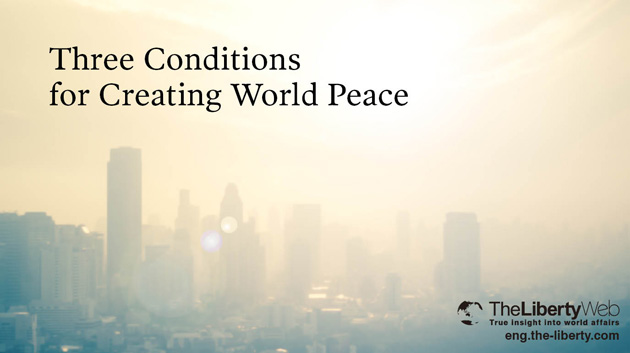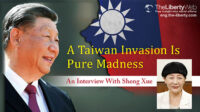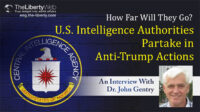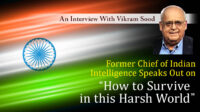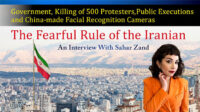Three Conditions For Creating World Peace
Editor's Monthly Column
Editor’s Monthly Column
Three Conditions For Creating World Peace
This year is the 70th anniversary of the establishment of the United Nations. In September this year, Chinese President Xi Jinping plans to appeal to the UN to allow the maintaining of the postwar regime, in a speech in which he represents China as a ‘victor of WWII’. The UN is an extension of the Allies that fought against Japan and Germany in WWII. The UN Charter still identifies Japan and Germany as enemies. If China were to judge that Japan or Germany were a ‘threat’, they have the freedom to engage in military action at any time. Thus, the connection between this and Xi’s proposition to maintain the postwar regime becomes obvious.
In Japan, debates over the Abe security legislation continue, but this is difficult to understand for the layperson. However, it is abnormal that Japan, an economic superpower is unable to protect its own people, and needsthe protection of U.S Forces. This year being the 70th anniversary for the end of WWII, is the perfect time for Japan to strip the label of an ‘enemy nation’ ‘incapable of defending itself’ , and become the torch-bearer of peace and justice in the world.
How To Engender Peace
The question arises as to how to engender peace. The ancient Greek philosopher, Plato, held that the ideal nation is one ruled by a soldier, merchant, and philosopher-king. That is, the courage of a soldier, the temperament of a merchant, and the wisdom of a philosopher-king would come together to form a just nation.
In international relations, this idea is often applied in the relationship between different nations to form a shared understanding of ‘peace’. That is, by maintaining the balance of power, mutual gain, and shared values, one can establish peace.
European political history serves as an example. The first half of the 1600s was preoccupied with religious wars, but a balance of power was achieved between France and Austria through the 1948 Peace of Westphalia. By the mid-1700s a new balance of power was formed between 5 major power that included England, Russia and Prussia. This created an additional sphere of mutual benefit of trade dealings between the countries.
100 Years Of Peace In Europe
After the 1814 Congress of Vienna, formed to deal with the aftermath of the French Revolution and the Napoleonic Wars, the various powers were able to connect through shared values. The aforementioned 5 countries were all monarchies, and since the French Revolution and the dangers of Napoleonic imperialism, they came to a unanimous agreement for the need to maintain their respective monarchies. As a result, apart from a few brief exceptions, Europe was able to enjoy around 100 years of peace.
This, however, was disrupted in the late 1800s by the rise of Germany. Germany, now a unified nation under Chancellor Otto von Bismarck, came to possess immense power, which eventually led into WWI.
After WWI, U.S President Woodrow Wilson promoted the formation of the League of Nations as a conference for humanity to bring peace. Isolationist citizens and the U.S. Congress, however, refused to join. Regardless, Wilson advanced that the balance of power between nations to be a filthy struggle. As a consequence, many of the agreements that became the bedrock of peace after the Congress of Vienna fell apart.
The concept of mutual economic benefit was derailed in 1929 with the emergence of the bloc economy after the Great Depression. Finally, the shared values that held nations together after the Napoleonic War were undermined, as the emerging nations of the United States, Germany, and Japan did not share a common understanding. America, while touting the virtues of Democracy, continued to act in an imperialistic manner, , Germany succumbed to totalitarianism, and Japan protested against Euro-American racism. Here, Russia entered as a communist power, which paved the way to WWII.
The 21st Century Is A Dangerous Era
What will the first half of the 21st century look like?
During the second half of the 20th century, a peculiar balance was maintained; a power of power between the U.S and the U.S.S.R, and a dissemination of mutual economic benefit and shared values with each camp. After the Cold War, it seemed that America would come to run the world as the sole superpower, but the U.S is showing signs of doubt. President Obama announced that America was no longer the world police, and his citizens have supported this isolationist view. Elsewhere, China aims to dominate Asia, and there is no end in sight to the conflicts in the Middle East. As America slowly turns inward, the balance of power around the world is beginning to crumble.
The system of mutual economic benefit that functioned around America, as displayed by the International Monetary Fund are beginning to show cracks due to competition from China’s Asia Infrastructure Investment Bank (AIIB).As political scientist Samuel P. Huntington had predicted, the coming era will see a clash of civilizations, between the Christian, Islamic, and Chinese spheres. . This indicates that the current age is a time of grave danger comparable to the two previous world wars.
1. Power-Balance Measures For The Upcoming Age
This is why the current era is in dire need of a peace that balances the respective balance of power, mutual economic benefit, and shared values.
Master Ryuho Okawa, of Happy Science has already been showing the way.
In June 2012, in a lecture titled “Be Strong”, Master Okawa said the following:
“If the United Nations functioned properly, their ‘justice’ would spread peace throughout the world, but right now, it is dysfunctional. Due to this, the world is seeking a new philosophy of peace and justice. I dare say, this new philosophy is in the hands of Happy Science.”
The first important thing is to make sure that the balance of power between China and U.S-Japan Alliance in East Asia does not crumble. America is getting cold feet, and is planning to follow a strategy that they will ‘help only if Japan can hold out for over 1 month by themselves in any conflict with China’. So Japan must now rapidly increase its defense capacity, and an alliance with countries that possess nuclear weapons, such as India and Russia, will become a source of deterrence. Japan must be able to command respect from America such that the latter will choose to help Japan in an emergency.
2. Mutual Profit Systems For The Upcoming Age
The failure of U.S-backed economic system became the catalyst for the emergence of China’s AIIB. America’s demands placed on various countries through the IMF was economic austerity, which required reducing government deficits and expenditures. From the viewpoint of developing countries, of course the AIIB would be more favorable as China will lend them money without these demands. Japan ought to cooperate with America while helping developing countries, and take the role of guiding these developing nations to econonmic independence. Japanese financial institutions should supply funds while educating locals to become entrepreneurs. Then, Japan could import the goods produced in the developing countries, and thus establish a relationship based on mutual prosperity. This is how each country can expand its economic prosperity, and only then can we really accommodate and create enough jobs for a population growing towards 10 billion.
3. Shared Values For The Upcoming Age
People in China and the Islamic region need freedom and Democracy, where each individual can pursue his or her own happiness. In China, there is no freedom of religious belief or the freedom of speech. America, while at times hesitant, is a country that seeks, as Woodrow Wilson, did to spread freedom and democracy all over the world. Japan must constantly remind America of this, and strive together to achieve this.
On the other hand, in dealing with the Islamic region, theChristian sense of mission is too strong in America. War will never end if Islamic extremists are labelled as ‘absolute evil’. There is the need for the kind of tolerance seen in the Roman Empire when they granted citizenship to foreign peoples. This will generally arise from a view of faith that Christianity and Islam follow a belief in the same God and therefore are closely related.
Huntington hoped for Japan to become an independent mediator between Christianity and Islam. Perhaps the situation could be created such that war between Christian and Islamic nations cannot proceed without prior attempts at mediation by Japan.
Achieving World Order Through Inner Cultivation
Such are the pillars of the peace that Happy Science upholds. In the Congress of Vienna, economic benefit and values were considered as part of the power equilibrium. In the Happy Science, this is reversed; shared values allows for the possibility of reorganizing shared economic benefit and the balance of power. That is, the potential for world order is hidden in spiritual cultivation.
It would be excellent if the UN could undergo reform with this concept of peace in mind. If not, there is always the option of creating a new international organization.
Looking at Japan today, it could very well be the world’s greatest with regards to Plato’s merchant ‘temperament’. On the other hand, Japan significantly lacks the courage of the soldier and the wisdom of the philosopher-king; they cannot even protect their own country by themselves, and philosopher-kings are nowhere to be seen.
To make Japan the protector of peace and justice, there is a need to revitalize the Bushido spirit and governance through philosopher-kings. That is the historical role of Happy Science and the Happiness Realization Party, founded by Master Ryuho Okawa.
Jiro Ayaori

